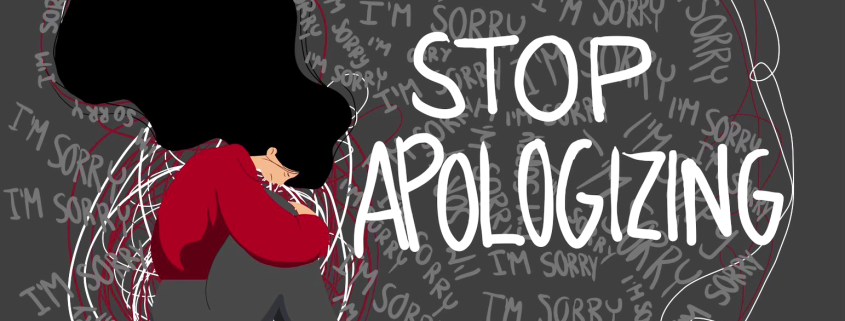I’m sorry, but I’m done apologizing for others

“Stop apologizing. You don’t need to apologize.”
Most of the time this sentiment is beyond valid, but I just can’t help but say “sorry” when something is disarrayed even when I’m tangentially involved, or not involved at all. The involuntary reaction often feels like shackles on my emotions as the words just fall out of my mouth before I can stop myself. But how did these shackles even get there?
According to The Swaddle writer Devrupa Rakshit, over-apologizing “stem[s] from a myriad of formative childhood experiences. For some, over-apologizing is a way to avoid conflict, especially if they grew up in a household where conflict sparked screaming matches, or led to violence.” Yeah, reading that hit a little hard so I thought I’d share my newfound wisdom.
My therapist doubled down on this painful truth by making me realize that part of saying sorry so much is a form of overcompensating emotionally for things out of my control. But attempting to do so through apologizing only takes more autonomy over my mentality. Suddenly, instead of just stepping in another person’s shoes, I run a marathon in them.
I’ve always seen apologies as a powerful act of empathy that can mend broken relationships as you take responsibility for your actions. Psychotherapist and author of “The Power of Apology” Beverly Engel wrote in Psychology Today that “Apolog[ies] ha[ve] the ability to disarm others of their anger and to prevent further misunderstandings. While an apology cannot undo harmful past actions, if done sincerely and effectively, it can undo the negative effects of those actions.”
Why wouldn’t I try to undo the negative effects that are hurting my loved ones? If I care about them, how could I ignore the fact that something happened to them? Even when I recognize that the negative emotions others project onto me have nothing to do with me and more to do with them, my mind drifts to the thought that I could have done something to relieve them of that experience.
But caring for someone and apologizing are two different things. While they are not mutually exclusive, one cannot replace the other.
Whether it be from a fear of abandonment, generalized anxiety or low-self esteem, over-apologizing is often an internalized coping mechanism many form due to traumatic experiences. The act of apologizing itself is not necessarily bad; it can be difficult for a person to do when they’re admitting that they’ve messed up. Showing genuine remorse and authentically wanting to make amends is something we all should do to take responsibility for our actions. The issue arises when an apology occurs for an action that you had absolutely nothing to do with.
Apologies aren’t magical cures for all the pain in the world. If that were the case, life would be so much easier. In apologizing to avoid conflict, it might feel like it’s the easy way out, but those emotions don’t disappear. They only grow and become more internalized — forming deep-seated, fervent roots in your mind. Taking the blame for others’ mistakes ends up repressing your own emotions to make room for someone else’s.
It’s hard to admit, but I know that my habit of over-apologizing isn’t just because I “care too much.” It’s also a result of insecurities, abandonment issues and PTSD from various forms of abuse I endured as a child. It’s even harder to admit that this habit creates more problems for me than it solves.
What’s the solution then? Only apologize when you’ve done something to hurt another person’s feelings, violated someone’s boundaries or if you have made a mistake. Easier said than done, right? Even as I’m writing this, I’m laughing at myself for being an absolute hypocrite. I have a habit of doing that. But this is a reminder for myself and everyone out there who is struggling with over-apologizing because it can suck the life out of you.
So, let’s review the things we do not and should not apologize for: Things you didn’t do; things others did; things others have a problem with when you’re just existing and living your life the way you want to that isn’t harming anyone; for simply asking a question because let’s take “There’s no stupid question” seriously. From now on, I refuse to be sorry for not knowing where the goddamn bathroom is.
Don’t apologize for your own feelings because life is hard enough. If someone has a problem with it, they can walk away. Vice versa: Don’t apologize for others’ feelings if you didn’t cause them. Too many gaslighters walk among us. Instead of apologizing, just stay vigilant for those attempting to manipulate your feelings in their favor.
And absolutely no apologizing for not having all the answers or not being able to respond right away — you’re not a dictionary or Google, and even search engines lag now and then. In summary, if you can’t control it, don’t apologize for it.
From now on, I’m only going to apologize for my own mistakes, for being so hard on myself and for taking on others’ problems when I haven’t even figured out my own. After all, you can only control yourself, so why apologize when others can’t control themselves? So, here’s one last apology for something that isn’t my fault, just to get it out of my system: I’m sorry that I’m not sorry anymore.
Good luck, and stop apologizing.

